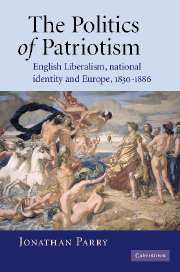Book contents
- Frontmatter
- Contents
- Acknowledgments
- Introduction
- PART I ENGLISH LIBERALISM AND NATIONAL IDENTITY
- 1 The English constitution and the liberal state
- 2 Character, morals and national identity
- PART II EUROPE AND LIBERAL POLITICS
- Conclusion: Liberalism, state and nation
- Abbreviations and select bibliography
- Index
1 - The English constitution and the liberal state
Published online by Cambridge University Press: 17 July 2009
- Frontmatter
- Contents
- Acknowledgments
- Introduction
- PART I ENGLISH LIBERALISM AND NATIONAL IDENTITY
- 1 The English constitution and the liberal state
- 2 Character, morals and national identity
- PART II EUROPE AND LIBERAL POLITICS
- Conclusion: Liberalism, state and nation
- Abbreviations and select bibliography
- Index
Summary
At the heart of nineteenth-century Liberalism was a liberal, inclusive reading of the English constitution. Liberals presented themselves as the only true defenders of the people, the only force energised by the moral power of public opinion, the only party able to uphold England's identity as a land of liberty. At several points, they stressed their commitment to constitutional reform in order to create a more effective national politics. Then they argued that Reform was in the English political tradition, which aimed at preventing oppression of popular liberties by ending vested-interest domination of politics. Reform, they said, would ensure the successful integration of the political nation and prevent class division.
But Reform would also legitimise the power of the state. Each of the three great nineteenth-century Reform Acts was followed by a strong Liberal push for a bold legislative programme. This reminds us that though constitutional, religious and economic liberty were all vital themes in Victorian politics, so was concern with the authority of the state to act on behalf of the national interest. Strong government could check the power of vested interests and could also improve national morals – by which was meant lower-class morals in particular, since Parliament was an overwhelmingly propertied body in this period. Within limits, the assertion of state power for these two purposes could be justified all the more easily as the nineteenth century wore on, since the claim that the state now represented ‘the people’ became stronger with each successive franchise extension.
- Type
- Chapter
- Information
- The Politics of PatriotismEnglish Liberalism, National Identity and Europe, 1830–1886, pp. 43 - 85Publisher: Cambridge University PressPrint publication year: 2006



